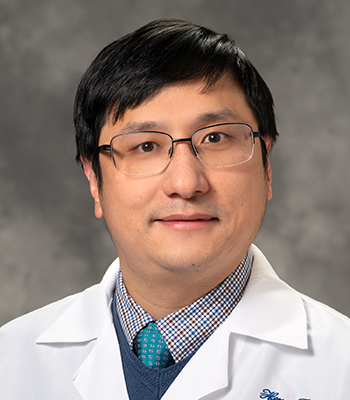Ling Huang
Address
Henry Ford Health Pancreatic Cancer Center 2799 West Grand Blvd, Rm 7087, Education and Research Building Detroit, MI 48202Department
Pathology
Research Interests
- Develop normal and tumor organoid models for understand the biology of pancreatic cancer initiation and progression
- Discover new biomarkers for early detection of pancreatic cancer
- Apply patient derived tumor models to identify novel treatment strategies for pancreatic cancer
Research Description
Dr Huang’s research focuses on understanding the interactions between oncogenic pathways and the human genetic background in pancreatic cancer development, particularly examining how such interactions alter the states of epithelial cells. His expertise encompasses the development of human organoid models derived from stem cells and patient tumor tissues, as well as the application of those human cell platforms to translational and clinical research. Through the application of stem-cell derived human organoids, he has provided evidence of KRAS mutant induces distinct morphological and molecule changes in human pancreatic ductal and acinar lineages. Additionally, Ling has shown that organoids serve as powerful tools for identifying candidates for diagnostic biomarkers of pancreatic cancer and for predicting patient responses to standard of care treatments.
Recent Publications
L. Huang, R. Desai, D. N. Conrad, N. C. Leite, D. Akshinthala, C. M. Lim, R. Gonzalez, L. B. Muthuswamy, Z. Gartner and S. K. Muthuswamy. Commitment and oncogene-induced plasticity of human stem cell-derived pancreatic acinar and ductal organoids. Cell Stem Cell. 2021;28:1090-104.
L. Huang, B. Bockorny, I. Paul, D. Akshinthala, P. O. Frappart, O. Gandarilla, A. Bose, V. Sanchez-Gonzalez, E. E. Rouse, S. D. Lehoux, N. Pandell, C. M. Lim, J. G. Clohessy, J. Grossman, R. Gonzalez, S. P. Del Pino, G. Daaboul, M. S. Sawhney, S. D. Freedman, A. Kleger, R. D. Cummings, A. Emili, L. B. Muthuswamy, M. Hidalgo and S. K. Muthuswamy. PDX-derived organoids model in vivo drug response and secrete biomarkers. JCI Insight. 2020;5:e135544.
J. E. Grossman*, L. Muthuswamy*, L. Huang*, D. Akshinthala, S. Perea, R. S. Gonzalez, L. L. Tsai, J. Cohen, B. Bockorny, A. J. Bullock, B. Schlechter, M. L. B. Peters, C. Conahan, S. Narasimhan, C. Lim, R. B. Davis, R. Besaw, M. S. Sawhney, D. Pleskow, T. M. Berzin, M. Smith, T. S. Kent, M. Callery, S. K. Muthuswamy and M. Hidalgo. Organoid Sensitivity Correlates with Therapeutic Response in Patients with Pancreatic Cancer. Clin Cancer Res. 2022;28:708-18. (* equal contribution).
Orr S, Huang L, Moser J, Stroopinsky D, Gandarilla O, DeCicco C, et al. Personalized tumor vaccine for pancreatic cancer. Cancer Immunology Immunotherapy. 2023;72:301-13.
S. Kahraman, E. Dirice, G. Basile, D. Diegisser, J. Alam, B. B. Johansson, M. K. Gupta, J. Hu, L. Huang, C. L. Soh, D. Huangfu, S. K. Muthuswamy, H. Raeder, A. Molven and R. N. Kulkarni. Abnormal exocrine-endocrine cell cross-talk promotes beta-cell dysfunction and loss in MODY8. Nat Metab. 2022;4:76-89.
S. C. Chafe, F. S. Vizeacoumar, G. Venkateswaran, O. Nemirovsky, S. Awrey, W. S. Brown, P. C. McDonald, F. Carta, A. Metcalfe, J. M. Karasinska, L. Huang, S. K. Muthuswamy, D. F. Schaeffer, D. J. Renouf, C. T. Supuran, F. J. Vizeacoumar and S. Dedhar. Genome-wide synthetic lethal screen unveils novel CAIX-NFS1/xCT axis as a targetable vulnerability in hypoxic solid tumors. Sci Adv. 2021;7:eabj0364.
F. M. Ferguson, B. Nabet, S. Raghavan, Y. Liu, A. L. Leggett, M. Kuljanin, R. L. Kalekar, A. Yang, S. He, J. Wang, R. W. S. Ng, R. Sulahian, L. Li, E. J. Poulin, L. Huang, J. Koren, N. Dieguez-Martinez, S. Espinosa, Z. Zeng, C. R. Corona, J. D. Vasta, R. Ohi, T. Sim, N. D. Kim, W. Harshbarger, J. M. Lizcano, M. B. Robers, S. Muthaswamy, C. Y. Lin, A. T. Look, K. M. Haigis, J. D. Mancias, B. M. Wolpin, A. J. Aguirre, W. C. Hahn, K. D. Westover and N. S. Gray. Discovery of a selective inhibitor of doublecortin like kinase 1. Nat Chem Biol. 2020;16:635-43.
Education/Training
B.Sc. 2003 East China University of Science and Technology
Ph.D. 2009 Purdue University
Postdoc 2009-2015 Princess Margaret Cancer Center, University of Toronto
